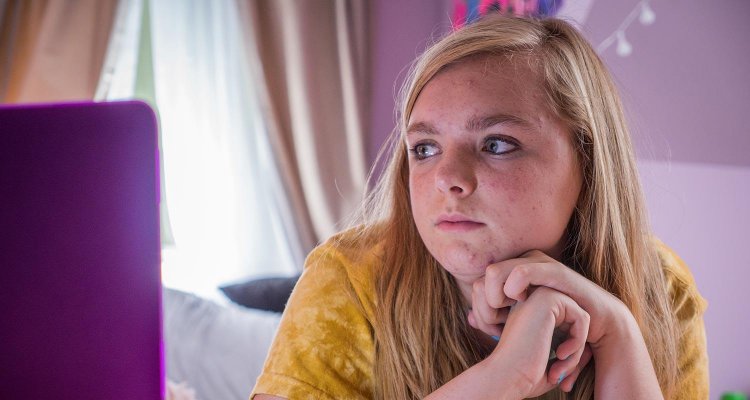Eighth grade can really suck. You know that pubescent, odorful, pimpled, anxious and, self-reflective middle ground between grade school and high school? Horrific experiences have happened to many during this very sensitive time in a young boy or girl’s life. Sometimes you carry these experiences, or scars, with you the rest of your days.
READ MORE: Sundance 2018: The Most Anticipated Films Of The Festival
Bo Burnham‘s “Eighth Grade,” an altogether impressive debut from the comedian, follows Kayla (Elsie Fisher), whose constant self-reflectiveness is familiar enough to make you cringe at every stutter. Kayla’s dad (Josh Hamilton) is as good a single dad as you can be, given the fact that he has to contend with his teenage girl entering the most awkward and uncomfortable phase of her life.
Burnham’s career began as a YouTube sensation at just 16-years-old, thanks to a parody music video, and quickly gained a solid fanbase which blossomed into a successful career making satirical music videos. And yet, nowhere did we expect him to produce a film as winning as “Eighth Grade,” a “Welcome to the Dollhouse” for the millennial generation. The film hits all the right notes that come with coming-of-age dramas. Burnham has quite the ear for the way millennial girls speak, as Kayla is as genuine and real a portrayal as we’ve seen at the movies. Fisher must be given immense credit for making it all work as her performance is pitch-perfect in every respect. Sometimes, it feels like you’re not even watching an actress perform but an actual person. The way Burnham shot some of the scenes makee it feel like non-fiction rather than fiction.
Just like Heather Matarazzo‘s Dawn in Todd Solodnz‘ film, Kayla is a teenager on the outside looking in, in every respect. However, if Solondz’ portrayal of teenagehood, although brilliant, had him not necessarily siding with his protagonist and even mocking her presence at every turn, Burnham, on the other hand, loves his lead character. Like every coming-of age movie, there’s a popular girl in class, and in “Eighth Grade,” it’s Kennedy (Catherine Oliviere), whose unhappily married mom seems to have the hots for Kayla’s dad. This all leads to Kennedy’s mom forcing her to invite Kayla to her daughter’s birthday party. Kennedy’s invite is typical of such a high-maintenance girl — “So my mom said to invite you, so this is me doing that,” she writes via text to Kayla. The party is, of course, an unmitigated wreck for Kayla as she sees that she’s not welcome by anyone there and quickly retreats to a room alone, on her phone, calling her Dad to pick her up as soon as possible.
Kayla has a crush on classmate Aiden (Luke Prael), a dull, almost motionless zombie-like teenager that gets by on his striking good looks and nothing else. When she does finally approach him, the conversation, or lack thereof, between the two turns into an offhand offer of a blowjob from Kayla. Like much of the movie, the dialogue from Kayla in this particular scene is filled with “umms” and “errs.” Kayla’s lack of self-confidence continuously makes her think up every word she should say to not look bad in front of the cool kids, but this kind of overthinking leads to conversations that are more awkward than they should be, and make Kayla seem even weirder to her classmates.
Burnham decides to have his movie take place as graduation looms just a few days away for these angst-ridden girls. This makes Kayla’s anxiety grow even further as she worries if high school will lead to better days or, God forbid, an even worse experience than she is living on a daily basis.
What makes “Eighth Grade” so unique and different from “Superbad” or “Mean Girls” is the fact that this is a whole new generation of kids. Gone are the in-your-face bullies of the plastics and in are the self-absorbed, glued to their smartphone millennials that don’t even bother spewing verbally abusive words to Kayla because, well, they’d rather look at their phones. The bullying is the lack of attention Kayla receives from her classmates. She’s a ghost wandering the hallways of the school, feeling like she’s nothing, and yet, she might just be the most humane and genuine person there. The constant anxious thoughts and mannerisms she displays separate her from the rest; she’s constantly aware of her surroundings, always on high alert.
What Burnham tries to give us with his movie is a snapshot of history in the making. This is a generation like no other, one that will most-likely grow up to be very different adults than anyone could have ever imagined. The zombie-like student body in “Eighth Grade” are slaves to technology, almost robot-like in their movements. Kayla is not. The anxiety Kayla has within her, the alertness to the world around her, always in a state of questioning, make the case for some kind of humanism and, yes, even advanced maturity. [B+]
Click here for our complete coverage from the 2018 Sundance Film Festival

